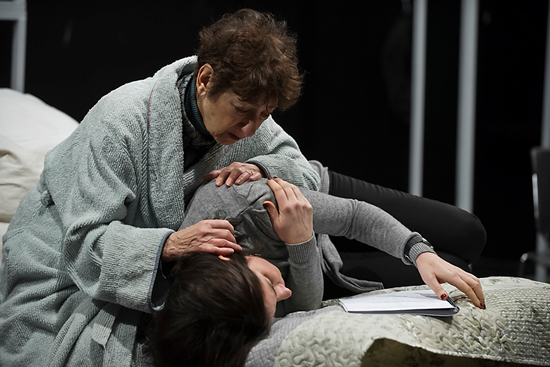An Absence of Memory
New play at Boston Playwrights’ Theatre explores dementia

Joanna Merlin plays Helen, a strong-willed matriarch losing her grip on both herself and her family. Photos by Kalman Zabarsky
Absence, a new drama about a woman with Alzheimer’s disease, will elicit a shock of recognition from anyone caring for a loved one with the disease.
The play, which closes out the Boston Playwrights’ Theatre’s 2013–2014 season, chronicles the mental decline of 76-year-old imperious matriarch Helen, from her initial diagnosis with the disease through worsening dementia and finally, death. In denial about her disintegrating condition, she struggles to hold on to her memories as she is forced to confront herself and her relationships with her family. The play raises the question: how does one survive in an ever-changing reality?
Absence is the first full-length play by Peter M. Floyd (GRS’12), a software developer who entered BU’s MFA playwriting program in his mid-40s. Inspired by his mother’s decadelong struggle with Alzheimer’s disease, he wanted to explore the world from her point of view. “I wanted to capture the nature of that experience and dramatize it in such a way that the audience would feel it along with the protagonist,” Floyd says. His thesis play, it has undergone numerous revisions.
That domineering, iron-willed protagonist is played by veteran actress Joanna Merlin, whose credits range from the original Broadway production of Fiddler on the Roof (she played one of the daughters, Tzeitel) to recurring roles on television—most notably as Judge Petrovsky in Law & Order: SVU—in The Good Wife (Loni Gosman), and Homeland (Grandma Lois). Merlin is also a faculty member in the graduate acting program at New York University’s Tisch School of the Arts.
“Helen understands what the diagnosis will be and is fighting hard to stay sane and in control,” Merlin says. “I needed to find the desperation that drives her to find control and redemption in her relationships before she is unable to function normally.”
Merlin brings extraordinary skill to her performance, vacillating rapidly among rage, paranoia, self-doubt, and frustration as her character desperately tries to hold onto the identity she’s worked a lifetime to create.
“Helen really struggled to control herself and her family while her mind was being whittled away,” Floyd says. “And out of this came a goal—a need to forge a connection with her husband and her daughter while still able to do so, while fighting against not just her disease, but also her own stubborn self.”

Through various theatrical devices, Floyd vividly simulates the experience of dementia onstage, allowing audiences to gain insight into the disease’s tolls. Characters often slip into a sort of gibberish, rendering their dialogue incomprehensible—an attempt to capture Helen’s bewilderment and confusion as she loses her ability to comprehend what others are saying. When she cries out, “I don’t understand you!” she is speaking not only for herself, but for the audience.
The play’s structure reflects the progression of Helen’s dementia, with scenes becoming increasingly fractured and abstract as her state worsens. “These devices, I discovered, had a kind of metaphorical truth that made them appropriate, even if they don’t literally represent what a patient with Alzheimer’s is experiencing,” Floyd says.
Absence confronts dementia’s effects not only on Helen, but on her family as well. They struggle as they witness this once-overbearing woman become unrecognizable. This is particularly true for Helen’s daughter, played by Anne Gottlieb (CAS’91), and her granddaughter, played by Beverly Diaz (CFA’16). “Absence also becomes about generations of women, with love, anger, and resentment being passed down from mother to daughter to granddaughter,” the playwright says.
Floyd’s exploration of dementia earned him a 2010 Jean Kennedy Smith Playwright Award, given for an outstanding student-written script that explores the human experience of living with a disability and administered by the Kennedy Center American College Theater Festival.
Absence, with its insight into the harrowing struggle of millions of people dealing with the ravages of Alzheimer’s, fulfills the award’s criteria. It’s not only art, but an exercise in empathy worth seeing.
Absence runs through March 2 at the Boston Playwrights’ Theatre, 949 Commonwealth Ave. Performances are Thursdays at 7:30 p.m., Fridays and Saturdays at 8 p.m., and Sundays at 2 p.m. Admission is $10 for students, $25 for BU faculty and staff and seniors (62+), and $30 general admission. Tickets can be purchased online or by calling the box office at 866-811-4111. By public transportation, take an MBTA Green Line B trolley to Pleasant Street.
Paula Sokolska can be reached at ps5642@bu.edu.
Comments & Discussion
Boston University moderates comments to facilitate an informed, substantive, civil conversation. Abusive, profane, self-promotional, misleading, incoherent or off-topic comments will be rejected. Moderators are staffed during regular business hours (EST) and can only accept comments written in English. Statistics or facts must include a citation or a link to the citation.